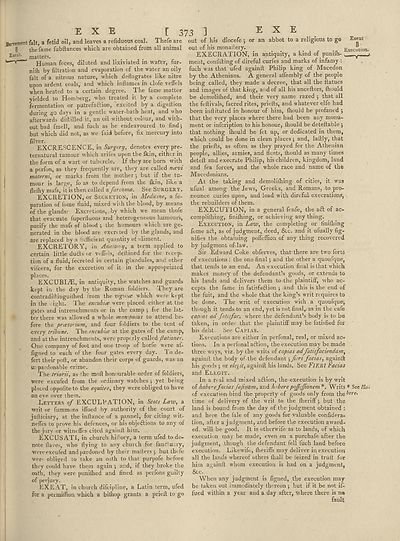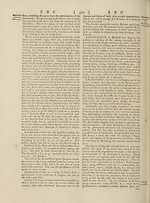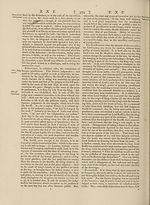Encyclopaedia Britannica, or, a Dictionary of arts, sciences, and miscellaneous literature : enlarged and improved. Illustrated with nearly six hundred engravings > Volume 8, ELE-FOR
(403) Page 373 - EXE
Download files
Complete book:
Individual page:
Thumbnail gallery: Grid view | List view

Exeat.
E X E
Esrrement fait, a fetid oil, and leaves a refiduous coal.
II the fame fubftances which are obtained from all animal
matters.
Human feces, diluted and lixiviated in wafer, fur-
nilh by filtration and evaporation of the water an oily
fait of a nitrous nature, which deflagrates like nitre
upon ardent coals, and which inflames in clofe veffels
when heated to a certain degree. The fame matter
yielded to Homberg, who treated it by a complete
fermentation or putrefaction, excited by a digeition
during 40 days in a gentle water-bath heat, and who
afterwards diftilled it, an oil without colour, and with¬
out bad fmell, and fuch as he endeavoured to find;
but which did not, as we faid before, fix mercury into
filver.
EXCRESCENCE, in Surgery, denotes every pre¬
ternatural tumour which arifes upon the fkin, either in
the form of a wart or tubercle. If they are born with
a perfon, as they frequently are, they are called navi
tnaterni, or marks from the mother; but if the tu¬
mour is large, fo as to depend from the fkin, like a
flefliy mafs, it is then called a farcoma. See Surgery.
EXCRETION, or Secretion, in Medicine, a fe-
paration of tome fluid, mixed with the blood, by means
of the glandsr Excretions, by which w^e mean thofe
that evacuate fuperfluous and heterogeneous humours,
purify the mafs of blood ; the humours which are ge¬
nerated in the blood are exert ted by the glands, and
are replaced by a fufficient quantity of aliment.
EXCRETORY, in Anatomy, a term applied to
certain little duds or veffels, deilined for the recep¬
tion of a fluid, fecreted in certain glandules, and other
vifeera, for the excretion of it in the appropriated
places.
EXCUBIiE, in antiquity, the watches and guards
kept in the day by the Roman foldiers. They are
contradiflinguiihed horn the viguice which were kept
in the , ight. The excubice were placed either at the
gates and intrenchments or in the camp ; for the lat¬
ter there was allowed a whole mawpuius to attend be¬
fore the preetorium, and four foldiers to the tent of
every tribune. 1'he excubice at the gates of the camp,
and at the intrenchments, were properly called/fa//o«er.
One company of foot and one troop of horfe were af-
figned to each of the four gates every day. To de-
fert their poft, or abandon their corps of guards, was an
u: pardonable crime.
The triarii, as the moft honourable order of foldiers,
were excufed from the ordinary watches ; yet being
placed oppofite to the equites, they were obliged to have
an eve over them.
Letters of EXCULPATION, in Scots Law, a
writ or fummons iflued by authority of the court of
judiciary, at the inftance of a pannel, for citing vvit-
neifes to prove his defences, or his objeftions to any of
the jury or witmfles cited again!! him.
EXCUSATI, in church hiflory, a term ufed to de¬
note Haves, who flying to any church for fanduary,
were excufed and pardoned by their mailers ; but thefe
wert obliged to take an oath to that purpofe before
they could have them again ; and, if they broke the
oath, they were punifhed and fined as perfons guilty
of perjury.
EXEAT, in church difeipline, a Latin term, ufed
for a permilhon which a biihop grants a prieil to go
[ 373 1
Thefe are out of his
E X E
diocefe ; or an abbot to a religious to go Exeat
out of his monaftery. # Execution.
EXECRATION, in antiquity, a kind of.pumih- ^/
ment, coniifting of direful curfes and marks of infamy :
fuch was that ufed again!! Philip king of Macedon
by the Athenians. A general ailembly of the people
being called, they made a decree, that all the llatues
and images of that king, and of all his anceftors, fhould
be demoliihed, and their very name razed ; that all
the feftivals, facred rites, priefts, and whatever elfe had
been inilituted in honour of him, ftiould be profaned ;
that the very places wEere there had been any monu¬
ment or infeription to his honour, fliould be deteftable ;
that nothing fliould be fet up, or dedicated in them,
which could be done in clean places; and, lailly, that
the priefts, as often as they prayed for the Athenian
people, allies, armies, and fleets, ihould as many times
deteft and execrate Philip, his children, kingdom, land
and fea forces, and the whole race and name of the
Macedonians.
At the taking and demoliflring of cities, it w'as
ufual among the Jews, Greeks, and Romans, to pro¬
nounce curfes upon, and load W'ith direful execrations,
the rebuilders of them.
EXECUTION, in a general fenfe, the aft of ac-
complilhing, finiftiing, or achieving any thing.
Execution, in Law, the completing or finiftiing
fome aft, as of judgment, deed, &c. and it ufually fig-
nifies the obtaining poffeflion of any thing recovered
by judgment of.law. .
Sir Edward Coke obferves, that* there are twro forts
of executions : the one final; and the other a quoufque,
that tends to an end. An execution final is that which
makes money of the defendant’s goods, or extends to
his lands and delivers them to the plaintiff-, who ac¬
cepts the fame in fatisfaftion ; and this is the end of
the fuit, and the whole that the king’s writ requires to
be done. The w’rit of execution wfith a quoufque;
though it tends to an end, yet is not final, as in the cafe
{■ap as ad fattsfac. where the defendant’s body is to be
taken, in order that the plaintiff may be fatisfied for
his debt See Capias.
Executions are either in perfonal, real, or mixed ac¬
tions. In a perfonal aftion, the execution may be made
three w-ays, viz. by the w rits of capias adfatisfaciendam,
aijainft the body of the defendant ; fieri facias, again!!
his goods ; or ele^it, again!! his lands. See FIERI Facias
and Elegit.
In a rval and mixed aftion, the execution is by writ
of habere facias fajimm, and habere pojfejjionem*. Writs * See
of execution bind the property of goods only from the^em
time of delivery of the writ to the ftieriff; but the
land is bound from the day of the judgment obtained :
and here the fale of any goods for valuable conlidera-
tion, after a judgment, and before the execution award¬
ed. will be good. It is otherwife as to lands, of which
execution may be made, even on a purchafe after the
judgment, though the defendant fell fuch land before
execution. Likewife, theriffs may deliver in execution
all the lands whereof others ftiall be ieized in trull for
him again!! whom execution is had on a judgment,
&c.
When any judgment is figned, the execution may
be taken out immediately thereon ; but if it be not if-
fued within a year and a day after, where there is no
fault
E X E
Esrrement fait, a fetid oil, and leaves a refiduous coal.
II the fame fubftances which are obtained from all animal
matters.
Human feces, diluted and lixiviated in wafer, fur-
nilh by filtration and evaporation of the water an oily
fait of a nitrous nature, which deflagrates like nitre
upon ardent coals, and which inflames in clofe veffels
when heated to a certain degree. The fame matter
yielded to Homberg, who treated it by a complete
fermentation or putrefaction, excited by a digeition
during 40 days in a gentle water-bath heat, and who
afterwards diftilled it, an oil without colour, and with¬
out bad fmell, and fuch as he endeavoured to find;
but which did not, as we faid before, fix mercury into
filver.
EXCRESCENCE, in Surgery, denotes every pre¬
ternatural tumour which arifes upon the fkin, either in
the form of a wart or tubercle. If they are born with
a perfon, as they frequently are, they are called navi
tnaterni, or marks from the mother; but if the tu¬
mour is large, fo as to depend from the fkin, like a
flefliy mafs, it is then called a farcoma. See Surgery.
EXCRETION, or Secretion, in Medicine, a fe-
paration of tome fluid, mixed with the blood, by means
of the glandsr Excretions, by which w^e mean thofe
that evacuate fuperfluous and heterogeneous humours,
purify the mafs of blood ; the humours which are ge¬
nerated in the blood are exert ted by the glands, and
are replaced by a fufficient quantity of aliment.
EXCRETORY, in Anatomy, a term applied to
certain little duds or veffels, deilined for the recep¬
tion of a fluid, fecreted in certain glandules, and other
vifeera, for the excretion of it in the appropriated
places.
EXCUBIiE, in antiquity, the watches and guards
kept in the day by the Roman foldiers. They are
contradiflinguiihed horn the viguice which were kept
in the , ight. The excubice were placed either at the
gates and intrenchments or in the camp ; for the lat¬
ter there was allowed a whole mawpuius to attend be¬
fore the preetorium, and four foldiers to the tent of
every tribune. 1'he excubice at the gates of the camp,
and at the intrenchments, were properly called/fa//o«er.
One company of foot and one troop of horfe were af-
figned to each of the four gates every day. To de-
fert their poft, or abandon their corps of guards, was an
u: pardonable crime.
The triarii, as the moft honourable order of foldiers,
were excufed from the ordinary watches ; yet being
placed oppofite to the equites, they were obliged to have
an eve over them.
Letters of EXCULPATION, in Scots Law, a
writ or fummons iflued by authority of the court of
judiciary, at the inftance of a pannel, for citing vvit-
neifes to prove his defences, or his objeftions to any of
the jury or witmfles cited again!! him.
EXCUSATI, in church hiflory, a term ufed to de¬
note Haves, who flying to any church for fanduary,
were excufed and pardoned by their mailers ; but thefe
wert obliged to take an oath to that purpofe before
they could have them again ; and, if they broke the
oath, they were punifhed and fined as perfons guilty
of perjury.
EXEAT, in church difeipline, a Latin term, ufed
for a permilhon which a biihop grants a prieil to go
[ 373 1
Thefe are out of his
E X E
diocefe ; or an abbot to a religious to go Exeat
out of his monaftery. # Execution.
EXECRATION, in antiquity, a kind of.pumih- ^/
ment, coniifting of direful curfes and marks of infamy :
fuch was that ufed again!! Philip king of Macedon
by the Athenians. A general ailembly of the people
being called, they made a decree, that all the llatues
and images of that king, and of all his anceftors, fhould
be demoliihed, and their very name razed ; that all
the feftivals, facred rites, priefts, and whatever elfe had
been inilituted in honour of him, ftiould be profaned ;
that the very places wEere there had been any monu¬
ment or infeription to his honour, fliould be deteftable ;
that nothing fliould be fet up, or dedicated in them,
which could be done in clean places; and, lailly, that
the priefts, as often as they prayed for the Athenian
people, allies, armies, and fleets, ihould as many times
deteft and execrate Philip, his children, kingdom, land
and fea forces, and the whole race and name of the
Macedonians.
At the taking and demoliflring of cities, it w'as
ufual among the Jews, Greeks, and Romans, to pro¬
nounce curfes upon, and load W'ith direful execrations,
the rebuilders of them.
EXECUTION, in a general fenfe, the aft of ac-
complilhing, finiftiing, or achieving any thing.
Execution, in Law, the completing or finiftiing
fome aft, as of judgment, deed, &c. and it ufually fig-
nifies the obtaining poffeflion of any thing recovered
by judgment of.law. .
Sir Edward Coke obferves, that* there are twro forts
of executions : the one final; and the other a quoufque,
that tends to an end. An execution final is that which
makes money of the defendant’s goods, or extends to
his lands and delivers them to the plaintiff-, who ac¬
cepts the fame in fatisfaftion ; and this is the end of
the fuit, and the whole that the king’s writ requires to
be done. The w’rit of execution wfith a quoufque;
though it tends to an end, yet is not final, as in the cafe
{■ap as ad fattsfac. where the defendant’s body is to be
taken, in order that the plaintiff may be fatisfied for
his debt See Capias.
Executions are either in perfonal, real, or mixed ac¬
tions. In a perfonal aftion, the execution may be made
three w-ays, viz. by the w rits of capias adfatisfaciendam,
aijainft the body of the defendant ; fieri facias, again!!
his goods ; or ele^it, again!! his lands. See FIERI Facias
and Elegit.
In a rval and mixed aftion, the execution is by writ
of habere facias fajimm, and habere pojfejjionem*. Writs * See
of execution bind the property of goods only from the^em
time of delivery of the writ to the ftieriff; but the
land is bound from the day of the judgment obtained :
and here the fale of any goods for valuable conlidera-
tion, after a judgment, and before the execution award¬
ed. will be good. It is otherwife as to lands, of which
execution may be made, even on a purchafe after the
judgment, though the defendant fell fuch land before
execution. Likewife, theriffs may deliver in execution
all the lands whereof others ftiall be ieized in trull for
him again!! whom execution is had on a judgment,
&c.
When any judgment is figned, the execution may
be taken out immediately thereon ; but if it be not if-
fued within a year and a day after, where there is no
fault
Set display mode to:
![]() Universal Viewer |
Universal Viewer | ![]() Mirador |
Large image | Transcription
Mirador |
Large image | Transcription
Images and transcriptions on this page, including medium image downloads, may be used under the Creative Commons Attribution 4.0 International Licence unless otherwise stated. ![]()
| Permanent URL | https://digital.nls.uk/192268658 |
|---|
| Attribution and copyright: |
|
|---|
| Description | Ten editions of 'Encyclopaedia Britannica', issued from 1768-1903, in 231 volumes. Originally issued in 100 weekly parts (3 volumes) between 1768 and 1771 by publishers: Colin Macfarquhar and Andrew Bell (Edinburgh); editor: William Smellie: engraver: Andrew Bell. Expanded editions in the 19th century featured more volumes and contributions from leading experts in their fields. Managed and published in Edinburgh up to the 9th edition (25 volumes, from 1875-1889); the 10th edition (1902-1903) re-issued the 9th edition, with 11 supplementary volumes. |
|---|---|
| Additional NLS resources: |
|

